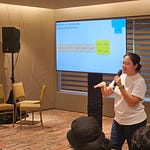Hello friends!
Today I’m sharing my recent conversation with Jules!
She is a senior consultant at Cynefin Co. and incredibly knowledgeable about social systems, especially in the context of ASEAN countries. Our conversation was very expansive and I am very grateful to be able to learn from her. She has been working on the SenseMaker®, and if you’re interested in short weekly updates from her perspective, please take a look at Jules’ Substack.
Here are some of the topics we were discussing:
The political impact of the US
China’s economic strategy
The need for human-centered organizational transformation in essential industries
Why internal organizational change can be more effective than relying on external consultants
Design as a gateway for business transformation
And much more.
Separately, not mentioned in the conversation but in the rest of this newsletter, I share my experience scaling project teams. Hiring a suitable and trustworthy freelancer for a new project is not trivial, especially in open collectives or Web3 organizations. The strategies below might be helpful, especially if you’re a team lead or project manager.
Recent internal updates
We had a small strategy meeting the other week, here’s a summary video elaborating on the updates below.
Justina, Anna, Marcus, and I met up for a small learning salon session earlier this month. We discussed the practice of note-taking after reading through a few articles on note-taking shared by Marcus.
Here’s a recording and summary of our discussion points and how the practice of note-taking seems to be evolving. We are now planning the next session in March.Separately, Marcus, Aslak, Sayf, and I were starting a sprint on a note-taking app that considers the principles above. Ideally, it should be something we could all use to keep track of the complexity of our note-taking practices.
Balint and I tried reaching out to past clients but had no success establishing meaningful conversations. He will try to call potential prospects, while I will focus on educational content distribution.
Rodolfo, Kishore, Sarah, and I tried to organize a small dinner event at EthDenver and even had buy-in from sponsors, but decided to postpone it to another occasion. Considering the short timeline, it was difficult to align sponsors’ interests and promise something we could execute. We will consider repeating it with more time to plan for the next conference or event.
I started writing two articles, one with Savannah, about my perspective on web3, and the other one with Anya on a sustainable branding approach for early-stage startups. I also recorded a workshop guide for sociocratic organizational design. My goal is to complete these pieces over the next week, share them across different channels, and sense which has the biggest impact.
I slightly edited our website and after taking a few scheduled calls from our CTA, I installed an analytics plugin to see how many people visit it. This will help us keep track of how our funnels work.

You can access the dashboard here.
Scaling a team without losing quality
Especially if you are leading, managing, or facilitating a team, you have likely faced the challenges of hiring someone new. Or maybe you don’t have the resources or time to follow a thorough hiring and interview process.
Unfortunately, gig economy platforms and DAOs have established norms for the extractive behaviors of freelancers (“hired guns“). Producing low-quality work is not risky when the exit costs are low, there is a secure or upfront payment, and there is no peer-verified reputation record.
In 2020, we grew our team from 2 people to about 30. Of course, mistakes happened but we learned to keep our quality standard under control. Here are a few options that seemed to work well for us, when a project needed support:
The first action is to contact experts in your existing value-aligned network or organization, who have proven a certain skill or expertise.
If they are unavailable, we would ask if they know someone they trust. They would most likely recommend someone who can deliver on the promise because otherwise, it would reflect on their reputation.
If we need to onboard someone outside of the trusted network, we ask an expert to supervise and support the new person on the project. This way we mentor and avoid critical mistakes.
If no expert is available to supervise, we would create a plan B and agree on fair compensation, considering the (lack of) evidence for the value of the work and reputation. We make clear that their contribution will be recorded in the working documents. If they deliver on their promise, they will stay in the network and likely keep working with your team in the future.
In my experience, having an explicit conversation about compensation is helpful. Overpaying with the expectation of over-delivery for example can backfire, as it might signal that you have too many resources and don’t care a lot about the quality of the work.
The main goal is making every interaction a positive experience for both sides and fair, considering the risk. If mistakes happen on the project, they can be framed as collective growth.

In my experience, the general approach above seems to work well particularly for project managers in more flexible working environments that support autonomy.
Meet experts IRL
Feb 23rd - Mar 2nd - EthDenver - I won’t be there but if you’d like to meet with a few experts from Deep Work, leave a message in this TG group. In addition to that, here are some side events from our friends:
If you’re going to Denver, enjoy your trip!
See you next time,
Andrej








